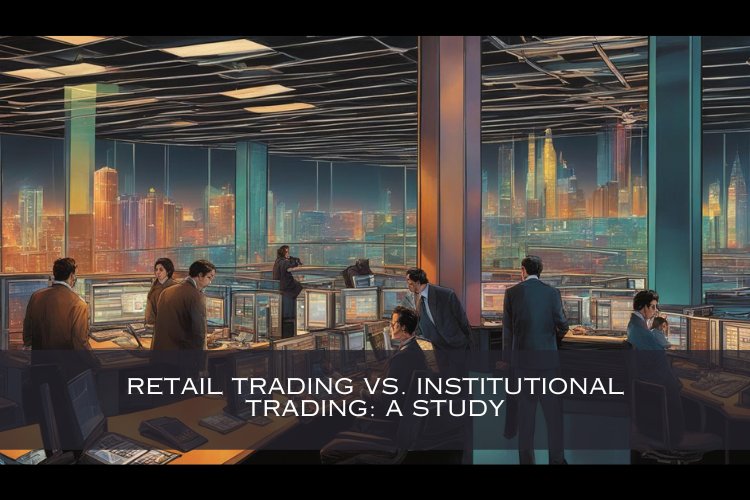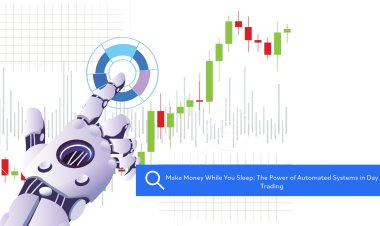Retail Trading vs. Institutional Trading: A Study
Dive into the exciting worlds of retail trading and institutional trading. Uncover intriguing strategies, similarities, and notable contrasts. Join us!

Retail Trading vs. Institutional Trading: A Study
Are you interested in exploring the exciting world of online trading? Do you want to understand the differences between retail trading and institutional trading? Then this article is for you! We will delve into the strategies, similarities, and notable contrasts between retail trading and institutional trading in the financial markets.
While both retail and institutional trading involves buying and selling securities, the approaches and goals of these two types of traders differ significantly. Retail traders typically participate in the financial markets through online platforms, whereas institutional traders involve large financial institutions, such as banks, hedge funds, and investment firms, trading on behalf of their clients.
In this article, we will explore the tools, strategies, and trends that shape retail trading and institutional trading. We will examine how retail and institutional traders engage in forex and stock trading and evaluate the role of trading platforms and risk management in both approaches.
Join us as we uncover the exciting realm of online trading and examine its impact on the financial markets.
Key Takeaways:
- Retail trading and institutional trading are two different approaches to participating in the financial markets.
- Retail traders use online platforms, while institutional traders involve large financial institutions.
- Understanding the differences between the two approaches is crucial for making informed decisions when navigating the financial markets.
- Retail traders and institutional traders employ different trading strategies and tools to achieve their goals.
- Stay tuned for more insightful articles on trading strategies and investment approaches.
Understanding retail trading
Have you ever wondered how those everyday people make a fortune trading online? Well, those are the retail traders. They are the individuals who participate in the financial markets through online platforms. So, what tools and strategies do retail traders typically employ?
Firstly, retail traders require a trustworthy trading platform to execute their trades. With a plethora of trading platforms available on the internet, it's crucial to choose one that aligns with your trading style and preferences.
Once you have selected a platform, the next step is to study trading strategies. Many online resources provide trading education for retail traders, from basic concepts to advanced strategies.
Market analysis is a critical aspect of successful retail trading. Retail traders need to keep an eye on economic calendars, news events, and technical indicators. These analyses can provide insights into market trends and potential opportunities.
In short, retail traders need a reliable trading platform, education on trading strategies, and market analysis to make informed decisions and succeed in the financial markets.
Exploring institutional trading
While retail traders are individual investors, institutional traders represent large financial institutions such as banks, hedge funds, and investment firms. These institutions use specialized trading platforms, trading software, and trading tools to execute trades on behalf of their clients.
Institutional trading involves trading in various financial markets, such as bonds, equity trading, and derivatives. Institutional traders are responsible for managing massive amounts of money, requiring them to be highly skilled and well-equipped with the latest financial analysis tools and data.
One of the primary characteristics of institutional trading is equity trading, which involves trading stocks in the stock market. Institutional traders use their vast resources to analyze the stock market, including sophisticated algorithms and proprietary trading software.
|
Retail Trading |
Institutional Trading |
|
Individual investors |
Large financial institutions |
|
Use online trading platforms |
Use specialized trading platforms and software |
|
Relies on personal analysis and market research |
Uses advanced financial analysis tools and data |
Institutional traders also have access to more significant market data than retail traders, enabling them to make informed investment decisions. As a result, institutional trading tends to focus on making more substantial investments that generate significant returns in the long run.
Despite their many advantages, institutional traders face challenges such as financial market volatility and other external factors that can negatively impact their clients' investments. As a result, successful institutional traders must be highly skilled at managing risks.
"Institutional trading is like playing chess—you need to be strategic, analytical, and quick on your feet. But when it comes to investing millions, there are no second chances."
Exploring institutional trading
One of the significant advantages of institutional trading is access to specialised trading platforms, software, and tools. These resources allow institutional traders to analyse and execute trades quickly and efficiently.
Some of the most popular institutional trading platforms include Bloomberg Terminal, Fidelity Pro, and E*TRADE Pro, all of which offer advanced tools and features that are not available to retail traders. Additionally, institutional traders use specialised software such as Reuters Eikon, a powerful market data analysis tool.
Another essential aspect of institutional trading is risk management. Institutional traders must be skilled at managing potential losses and minimising risks for their clients. They use strategies such as diversification and hedging to protect their clients' investments against market downturns.
Despite the benefits of institutional trading, it is not without its disadvantages. Institutional traders face strict regulations that can limit their investment opportunities, and they are often subject to high fees and commissions. Additionally, institutional traders are under significant pressure to meet their client's investment goals and generate significant returns, which can be challenging in a constantly changing financial market.
Overall, institutional trading offers many unique advantages, but it requires highly skilled traders and specialized resources to succeed. Whether you are a retail trader or an institutional trader, understanding the various strategies and tools used in the financial markets is crucial for making informed investment decisions.
The Forex Market: Retail vs. Institutional
Forex trading is a massive global market that operates 24 hours a day, five days a week. Retail traders and institutional traders engage in forex trading in different ways, employing distinct strategies to capitalise on market movements.
Retail Trading in the Forex Market
Retail traders participate in forex trading through online platforms, using a combination of trading tools and strategies to generate profits. Retail traders often rely on technical analysis, tracking price movements, and utilizing indicators to identify entry and exit points. Additionally, retail traders may also use fundamental analysis to evaluate economic events and news that may impact currency prices.
Trading platforms such as MetaTrader 4 and 5, cTrader, and NinjaTrader enable retail traders to execute trades, track their performance, and access a range of analytical tools and charts.
Market analysis is an essential part of retail trading. Many traders use news websites, social media, and economic calendars to stay informed about events that may impact currency prices.
In summary, retail traders in the forex market employ a variety of trading strategies and tools and rely on market analysis to make informed trading decisions.
Institutional Trading in the Forex Market
Institutional traders, on the other hand, operate on a much larger scale, trading millions or even billions of dollars on behalf of their clients. Institutional traders may use similar strategies to retail traders, such as technical and fundamental analysis, but on a more sophisticated level.
Institutional traders often use algorithmic trading, which involves the use of computer programs to execute trades automatically based on pre-defined rules. High-frequency trading is a specific form of algorithmic trading that involves executing a large number of trades in a matter of seconds.
Trading platforms used by institutional traders include Bloomberg Terminal, EBS, and Reuters Dealing. These platforms offer access to a range of advanced trading features, such as order book data and automated trade processing.
Market analysis is also crucial for institutional traders, who may utilize research reports, economic data, and financial news to inform their trading decisions.
Institutional traders in the forex market employ sophisticated trading software and strategies and execute trades on a much larger scale than retail traders.
Comparing retail and institutional trading strategies
There are notable differences in the trading strategies employed by retail and institutional traders in the forex market. Retail traders often focus on short-term trades, using technical analysis and market indicators to identify opportunities. In contrast, institutional traders may hold positions for longer periods, focusing on macroeconomic trends and events that impact currency prices.
Another significant difference between retail and institutional trading is the scale of their trades. Retail traders often make trades with small amounts of capital, while institutional traders execute trades worth millions or even billions of dollars.
Despite these differences, both retail and institutional traders can profit from forex trading by utilising effective strategies and staying informed about market trends and events.
Stock Trading: Retail vs. Institutional
Stock trading is a world of its own, offering a myriad of opportunities for both retail and institutional traders. While retail traders tend to invest in individual stocks or exchange-traded funds (ETFs), institutional traders often engage in equity trading on behalf of their clients. Let's explore the differences in trading strategies between these two trader types.
Retail Trading Strategies for the Stock Market
Retail traders make up a significant portion of the stock market, with platforms like Robinhood making it easier than ever for individuals to invest in stocks. Retail traders often rely on fundamental analysis, which involves researching a company's financial health and market trends. Technical analysis is also a popular strategy, which involves analyzing charts and patterns to identify potential buy or sell signals.
"Buy low, sell high—it's not rocket science; it's just retail trading."
Additionally, retail traders have become increasingly interested in algorithmic trading, which involves using computer programs to execute trades based on predetermined criteria. This approach can be particularly advantageous for retail traders, who may not have the resources to conduct extensive market analysis on their own.
Institutional Trading Strategies for the Stock Market
Unlike retail traders, institutional traders have access to vast amounts of resources, including sophisticated trading software, specialized tools, and experienced trading teams. These resources allow institutions to engage in high-frequency trading and algorithmic trading, which involves using algorithms to execute trades at lightning speeds.
Institutional traders also tend to engage in more complex trading strategies, such as arbitrage trading, which involves taking advantage of price discrepancies between different markets or securities. Additionally, institutional traders have access to information that may not be available to retail traders, such as insider knowledge about a company's financial performance.
The Growing Influence of Algorithmic Trading
Algorithmic trading has become increasingly popular among both retail and institutional traders, impacting the stock market in significant ways. According to a recent study, algorithmic trading accounts for over 50% of trading volume in the U.S. stock market.
While algorithmic trading can increase efficiency and reduce trading costs, it can also lead to increased volatility and market manipulation. Therefore, it's essential to understand the risks and benefits associated with this approach.
As the stock market continues to evolve, both retail and institutional traders must stay informed about emerging trends and changing regulations to remain successful. By understanding the differences in trading strategies between these two trader types, individuals can make informed decisions when investing in the stock market.
The Role of Trading Tools and Platforms
If Batman had his utility belt, then traders would have their own trading tools and platforms. These nifty gadgets level the playing field between retail traders and institutional traders, granting individual traders access to real-time market data and advanced trading software that facilitates lightning-fast trades and market analysis.
When it comes to trading platforms, there are many options available for traders. The most popular trading platforms among retail traders include the trading platform MetaTrader and the web-based platform TradingView. Institutional traders, on the other hand, frequently use proprietary trading software, such as CQG and Bloomberg Terminal.
But trading tools and platforms aren't just limited to software. Traders also rely on a set of tools that help them analyse market trends and identify potentially profitable trades. These tools can range from simple price charts to complex technical indicators, such as Bollinger Bands and RSI.
Now, if you're a retail trader, you might be thinking, "Great, but what about us little guys? Do we have access to these fancy tools and platforms?" Fear not, my friend, for there are plenty of trading tools and platforms available for retail traders. In fact, many of the tools that institutional traders use are also available to retail traders, such as algorithmic trading software and options trading platforms.
The Best Trading Platforms for Retail Traders
Here are a few of the best trading platforms for retail traders:
|
Trading Platform |
Description |
|
MetaTrader |
A highly customizable trading platform that offers a wide range of technical analysis tools. |
|
TradingView |
A web-based platform that allows traders to create and share custom technical indicators and analysis tools. |
|
TradeFxP |
An algo trading platform that allows traders to copy the trades of successful traders. |
So, there you have it. Trading tools and platforms are essential for both retail and institutional traders. Whether you're a seasoned pro or just starting out, having the right tools at your disposal can make all the difference in your trading success.
Evaluating Risk Management in Retail and Institutional Trading
When it comes to investing in the financial markets, risk management is critical for both retail traders and institutional traders. While each may employ different strategies, the goal remains the same: to protect investments and minimize potential losses.
For retail traders, risk management strategies can include:
- Setting stop-loss orders to limit losses
- Diversifying their portfolio with a mix of assets
- Adopting a long-term investment approach
Institutional traders, on the other hand, may employ more complex risk management strategies, such as:
- Using sophisticated trading software to monitor risks and make real-time adjustments
- Hedging their investments through the use of derivatives
- Ensuring proper diversification across clients' portfolios
Regardless of the approach, risk management is a crucial component of successful trading. By employing sound risk management strategies, traders can minimize losses and protect their investments in volatile financial markets.
The Importance of Investment Education
One of the key factors in effectively managing risk is having a thorough understanding of the financial markets and the assets being traded. For both retail and institutional traders, investment education is critical to making informed decisions and minimising potential losses.
"Investing in yourself is the best investment you will ever make. It will not only improve your life; it will improve the lives of all those around you." Robin S. Sharma
By staying up-to-date on market trends and analysis, traders can develop effective strategies for minimising risks and maximising returns. In addition, ongoing education and training can help traders stay ahead of the curve and adapt to changing market conditions.
The bottom line
Regardless of whether you're a retail trader or an institutional trader, risk management should be a top priority when investing in the financial markets. By employing sound strategies and staying informed, traders can protect their investments and achieve success in this exciting and dynamic arena.
The Advantages and Disadvantages of Retail and Institutional Trading
So, you're interested in trading, but you're not sure whether to go for retail or institutional trading. Well, fear not, my friend, for we're about to break it down for you in this section.
The pros and cons of retail trading
Let's start with retail trading. One of the main advantages of this approach is accessibility. Anyone with an internet connection and a bit of spare cash can start trading.
Another advantage is the variety of trading platforms available to retail traders. From the user-friendly apps to the more advanced ones, there's something for everyone.
However, retail trading isn't all sunshine and rainbows. One of the main downsides is the lack of resources. Retail traders often don't have the same access to research and analysis as institutional traders.
Another potential disadvantage is the higher risk associated with retail trading. Without proper research and risk management strategies, retail traders can quickly lose their investments.
The pros and cons of institutional trading
Now let's move on to institutional trading. One of the main advantages of this approach is the institutional traders' access to resources. These traders have dedicated teams of analysts and researchers at their disposal.
Another advantage is that institutional traders are generally more experienced and have a deeper understanding of the financial markets.
However, institutional trading isn't without its drawbacks. For one, it's generally only accessible to high-net-worth individuals and large organisations.
Furthermore, institutional traders often rely on complex trading strategies and algorithms, which can lead to higher levels of risk.
The bottom line
So, which approach is better for you? Well, it really depends on your investment goals and risk tolerance. If you're just starting out and have a limited budget, retail trading may be the way to go.
On the other hand, if you have a larger budget and are looking for more guidance and access to resources, institutional trading may be a better option.
Regardless of which approach you choose, it's important to remember that the financial markets can be unpredictable. It's crucial to do your research, develop a solid trading strategy, and practice good risk management techniques.
Future Trends in Retail and Institutional Trading
As the financial markets continue to evolve, the world of retail and institutional trading is also experiencing significant advancements. Here are some of the emerging trends that traders need to keep an eye on:
The Rise of Artificial Intelligence (AI)
AI is becoming an essential tool for traders, providing them with invaluable insights into the financial markets. Retail traders are increasingly using AI-powered trading tools, such as chatbots and automated trading algorithms, to make more informed investment decisions. Institutional traders are also leveraging AI to analyse vast amounts of data and identify profitable trading opportunities with greater speed and accuracy than ever before.
The Emergence of Social Trading
Social trading is a growing trend that allows retail traders to follow and copy the trades of successful traders. This approach allows them to learn from the experiences of others and make better investment decisions. Institutional traders are also using social trading to share their insights and strategies with other traders and build a network of like-minded professionals.
The Implementation of Blockchain Technology
Blockchain technology has the potential to revolutionise the financial markets by providing a secure and transparent platform for trading and settlement. Retail and institutional traders are increasingly using blockchain-based trading platforms, which offer faster transaction times and lower fees than traditional trading platforms.
The Expansion of ESG Investing
Environmental, social, and governance (ESG) investing is becoming more popular among both retail and institutional traders. ESG investing focuses on investing in companies that prioritise sustainability, social responsibility, and good governance practices. Institutional traders are increasingly incorporating ESG factors into their investment strategies, while retail traders are also becoming more interested in socially responsible investing.
The Growing Importance of Cybersecurity
With the increasing use of technology in the financial markets, cybersecurity is becoming a critical concern for traders. Retail and institutional traders need to be aware of the risks posed by cyber threats and take steps to protect their investments. This includes implementing robust cybersecurity measures such as two-factor authentication, anti-virus software, and encryption.
These emerging trends are transforming the world of retail and institutional trading, providing traders with new tools and strategies to navigate the complex financial markets. By staying up-to-date with these trends, traders can stay ahead of the curve and make informed investment decisions.
Conclusion
Well, folks, that's a wrap! We hope you enjoyed exploring the exciting yet complex world of retail trading and institutional trading. As we've seen, both approaches have their own unique advantages and disadvantages when it comes to trading in the stock and forex markets.
Whether you're a retail trader looking to sharpen your trading strategies or an institutional trader seeking to leverage your specialised tools, it's important to stay informed about the latest market trends and developments.
At the end of the day, successful trading is all about making informed decisions and managing risk effectively. So, keep an eye on those market trends, stay up-to-date on the latest trading tools and platforms, and always be ready to adapt your strategies as needed.
We hope you find this article informative and helpful. Stay tuned for more witty insights and trading tips from our team of expert journalists. And remember, when it comes to retail trading and institutional trading, the name of the game is investment. Happy investing, folks!
FAQ
What is the difference between retail trading and institutional trading?
Retail trading refers to individual traders who participate in the financial markets through online platforms, while institutional trading involves large financial institutions trading on behalf of their clients.
What are some common tools and strategies used by retail traders?
Retail traders commonly use trading platforms, trading education, and market analysis to inform their trading decisions.
What are some unique characteristics of institutional trading?
Institutional trading utilises sophisticated trading software and specialised tools to execute trades on a larger scale.
How do retail and institutional traders engage in the forex market?
Retail and institutional traders employ different trading strategies and rely on market analysis to make decisions in the forex market.
How do retail and institutional traders approach stock trading?
While both participate in stock trading, retail traders often employ various strategies, including algorithmic trading, while institutional traders focus on larger-scale equity trading.
What role do trading tools and platforms play in retail and institutional trading?
Trading tools and platforms are essential for executing trades efficiently in both retail and institutional trading.
How do retail and institutional traders manage risk in their trading?
Both retail and institutional traders implement risk management strategies to protect their investments in the dynamic financial markets.
What are the advantages and disadvantages of retail and institutional trading?
Retail trading offers accessibility and potential returns, while institutional trading has access to greater resources but comes with higher risks. Each approach has its pros and cons.
What are some future trends in retail and institutional trading?
Emerging trends include technological advancements, the rise of social trading, and the impact of regulatory changes on the industry.
What can individuals gain from understanding retail and institutional trading strategies?
By understanding the strategies employed by both retail and institutional traders, individuals can make informed decisions when navigating the financial markets.
TradeFxP Features
If you choose to be a self-employed retail trader, here are a few things we offer:
- The best trading platform
- No Requotes
- Lowest Spreads
- High-level liquidity
- Interbank connectivity
- Pure STP/DMA/ECN
- Free signals
- Best support
- Crypto Wallet and withdrawals / Deposits (USDT)
- Robust CRM
- TradeFxP wallet
- Once click withdrawal
- Multiple payment options
- Local offices to walk in
- Free VPS
- Free Video Chat / Virtual Meetings
- And many more…
If you choose to be a part of our managed account programme,
- All of the above +
- 1-2% Daily Profits
- High-level risk management
- Capital protection
- Only 30% of the capital used
- Negative balance protection
- Our fee is from the profits only
- Monthly profit withdrawal
- Wallet system – Use it like Phonepe, or Google Pay
- Crypto wallet and withdrawals / Deposits (USDT)
- Live monitoring
- MyFxbook Live monitoring
- Copy Trading
- And many more…
Optional: If you do not withdraw your profits for 2 months, our system will use those profits to trade and will keep your 100% capital safe and secure for margin purposes. This is optional, and if you choose not to be a part of it, you can withdraw your profits from the first month itself.
Why 1-2% daily? Can't your managed forex account earn more?
Yes, we can! Remember: greed may be good in the beginning, but in the end, it will destroy everything. You and I know that! Many droplets make an ocean! Join the Managed Account Programme and sit back for six months, then look at your account. You'll see that our strategy is good and the best. Do you know what I mean?
If you choose to be a part of us as an introducing broker (IB) or channel partner,
- Industry-best rebates
- Local Office support
- Staff support
- Marketing support
- Marketing materials
- And many more…
Having said that,
You can join our Forex Managed Account programme and earn 1-2% profits daily. See for yourself by clicking the below link.
Have a great journey, and may you catch some big waves on your way to prosperity!
To see Ai Forex Trading for real, use these credentials.
- Low-risk strategy:
- Mt4: 112018
- Pw: Allah@101
- Server: TradeFxP live,
1. To read why you should be with us, click here.
2. To open an account, click here.
3. To see our regulation certificate, click here.
4. To see our news with the IFMRRC, click here.
5. For claims, click here.
6. For the main site, click here.
7. For blogs and articles, click here.
8. Main Website: www.TradeFxP.com



 admin
admin 










